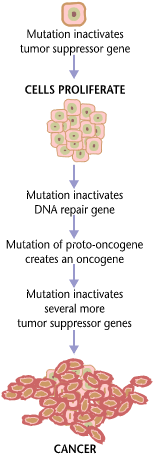Carcinogenesis
(Redirected from Neoplastic transformation)
Carcinogenesis is the process by which normal cells are transformed into cancer cells. The process is characterized by a series of genetic and epigenetic changes that lead to uncontrolled cell growth and the potential to invade or spread to other parts of the body. Carcinogenesis is a complex, multi-step process that involves the interplay of various factors, including genetic mutations, environmental influences, and lifestyle choices.
Stages of Carcinogenesis[edit | edit source]
Carcinogenesis can be broadly divided into three stages: initiation, promotion, and progression.
Initiation[edit | edit source]
The initiation stage involves genetic mutations that occur in the DNA of a normal cell. These mutations can be caused by various factors, such as exposure to carcinogens like tobacco smoke, radiation, and certain chemicals. The mutations may affect genes that regulate cell growth and division, such as oncogenes and tumor suppressor genes.
Promotion[edit | edit source]
During the promotion stage, the initiated cells undergo clonal expansion. This stage is characterized by the selective growth of the mutated cells, which is often driven by external factors such as hormones, inflammation, and dietary components. Unlike initiation, the changes in this stage are reversible if the promoting factors are removed.
Progression[edit | edit source]
The progression stage involves further genetic and epigenetic changes that lead to increased malignancy. During this stage, the cancer cells acquire the ability to invade surrounding tissues and metastasize to distant organs. This stage is marked by increased genetic instability and the accumulation of additional mutations.
Mechanisms of Carcinogenesis[edit | edit source]
Carcinogenesis involves several mechanisms, including:
Genetic Mutations[edit | edit source]
Mutations in specific genes play a crucial role in the development of cancer. These mutations can be inherited or acquired. Key genes involved in carcinogenesis include proto-oncogenes, which can become oncogenes, and tumor suppressor genes, which, when inactivated, lead to uncontrolled cell growth.
Epigenetic Changes[edit | edit source]
Epigenetic changes, such as DNA methylation and histone modification, also contribute to carcinogenesis. These changes can alter gene expression without changing the DNA sequence, leading to the activation of oncogenes or the silencing of tumor suppressor genes.
Environmental Factors[edit | edit source]
Exposure to environmental carcinogens, such as ultraviolet radiation, asbestos, and certain chemicals, can increase the risk of developing cancer. Lifestyle factors, such as diet, physical activity, and smoking, also play a significant role in carcinogenesis.
Prevention and Treatment[edit | edit source]
Preventing carcinogenesis involves reducing exposure to known carcinogens and adopting a healthy lifestyle. Regular screening and early detection can also help in the prevention and treatment of cancer. Treatment options for cancer include surgery, radiation therapy, chemotherapy, and targeted therapy.
See Also[edit | edit source]
References[edit | edit source]
External Links[edit | edit source]
Search WikiMD
Ad.Tired of being Overweight? Try W8MD's physician weight loss program.
Semaglutide (Ozempic / Wegovy and Tirzepatide (Mounjaro / Zepbound) available.
Advertise on WikiMD
|
WikiMD's Wellness Encyclopedia |
| Let Food Be Thy Medicine Medicine Thy Food - Hippocrates |
Translate this page: - East Asian
中文,
日本,
한국어,
South Asian
हिन्दी,
தமிழ்,
తెలుగు,
Urdu,
ಕನ್ನಡ,
Southeast Asian
Indonesian,
Vietnamese,
Thai,
မြန်မာဘာသာ,
বাংলা
European
español,
Deutsch,
français,
Greek,
português do Brasil,
polski,
română,
русский,
Nederlands,
norsk,
svenska,
suomi,
Italian
Middle Eastern & African
عربى,
Turkish,
Persian,
Hebrew,
Afrikaans,
isiZulu,
Kiswahili,
Other
Bulgarian,
Hungarian,
Czech,
Swedish,
മലയാളം,
मराठी,
ਪੰਜਾਬੀ,
ગુજરાતી,
Portuguese,
Ukrainian
Medical Disclaimer: WikiMD is not a substitute for professional medical advice. The information on WikiMD is provided as an information resource only, may be incorrect, outdated or misleading, and is not to be used or relied on for any diagnostic or treatment purposes. Please consult your health care provider before making any healthcare decisions or for guidance about a specific medical condition. WikiMD expressly disclaims responsibility, and shall have no liability, for any damages, loss, injury, or liability whatsoever suffered as a result of your reliance on the information contained in this site. By visiting this site you agree to the foregoing terms and conditions, which may from time to time be changed or supplemented by WikiMD. If you do not agree to the foregoing terms and conditions, you should not enter or use this site. See full disclaimer.
Credits:Most images are courtesy of Wikimedia commons, and templates, categories Wikipedia, licensed under CC BY SA or similar.
Contributors: Prab R. Tumpati, MD





